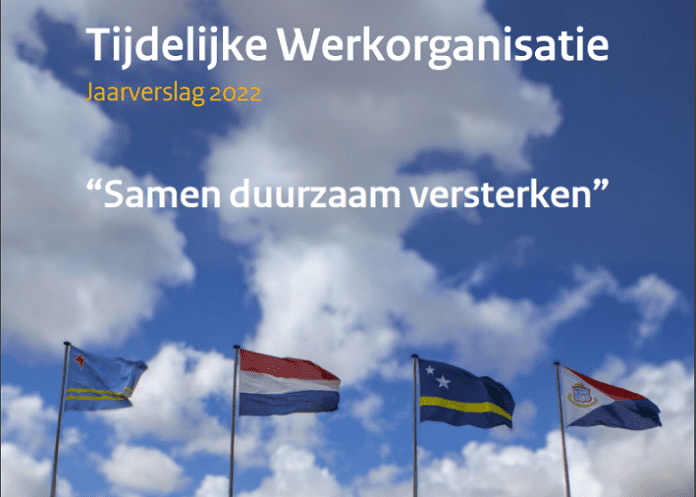“There is no one-size-fits-all solution”
The Hague – The Temporary Work Organisation (TWO), which is part of the Ministry of the Interior and Kingdom Relations, has published its annual report for the year 2022, entitled Samen duurzaam versterken (‘Strengthening together sustainably’). The annual report gives the reader an impression of TWO’s collaboration with Dutch ministries and the countries in implementing the Country Packages.
Despite the timing of publication, TWO wanted to avail itself of the opportunity to present the people of Aruba, Curaçao and St. Maarten with the positive developments resulting from the Country Packages in the preceding year. “2022 was the year in which the collaboration between TWO and our counterparts in the countries took further shape, based on ownership, equality and communality”, reflects TWO Programme Manager Judith Jeurissen in the foreword.
Staff members tell their stories: who am I within TWO?
The reader makes the acquaintance of a number of TWO staff members, who talk about their roles and their motivation for choosing this organisation. “I want to make a constructive contribution to the development of the country”, says one staff member.
This is also the central theme for the three other staff members: the wish to make a contribution to the country where they live, where they were born or with which they have a special relationship.
Strategy and collaboration among ministries
In the annual report, TWO explains the creation of the programme and the formation of the Country Packages. The strategic approach towards jointly achieving a long-term result is addressed as well. It was clear at an early stage that there is no one-size-fits-all solution. In each country, there are slightly different challenges or one solution works better than another. Consideration is also given to lessons learned from the past so as to achieve a long-lasting result.
In order to support the countries in the reforms, TWO cooperates with other Dutch ministries. These ministries provide the substantive knowledge about the various subjects and, together with the ministries in the countries, work on the requisite steps to bring about the desired reforms. In the report, representatives from the Dutch Ministry of Social Affairs and Employment and the Education Inspectorate talk about their experiences in the three countries. What matters in this context is to empathise with the countries, and first and foremost not to measure them by Dutch standards.
The countries
The work done by TWO would be meaningless if there was no collaboration with the counterparts in Aruba, Curaçao and St. Maarten. From Aruba, staff members of TWO Netherlands and TWO Aruba talk about their cooperation: “Although we go toe-to-toe on the content, the relationship is very important”. Another interviewee talks about the process of setting up a National Statistics System in Aruba. This system helps Aruba to take well-substantiated policy decision, with consideration being given to aspects such as fact-based economic development.
In Curaçao, an interviewee talks about the project to consolidate legislative texts. As part of this project, legislative texts from the days of the Netherlands Antilles and all amendments implemented after 10 October 2010 are processed into one text. This is important, because the laws and regulations in force must be clear and unambiguous to everyone. The report also addresses the ‘Schools maintenance backlog’ project, for which the Netherlands has made €30 million available.
In the chapter on the reforms in St. Maarten, the report describes the measures taken to encourage entrepreneurship and reduce the obstacles for entrepreneurs. There is also an article about the modernisation of the Belastingdienst. In this context, the Netherlands has made €15 million available. The key elements of this modernisation are meant to improve the relationship with the taxpayer, the customer, and to update the work processes.
Financial perspective
Finally, the report describes the financial perspective. Among other things, the reader can see that TWO spent €14.2 million in 2022 on the implementation of the Country Packages. This figure was €10.55 million in 2021. This involves both the funding of projects (programme) and the costs of staff members of TWO, other Dutch line ministries and experts borrowed or hired for specific projects in the countries (human resources).
Altogether, €8.6 million was spent in 2022 on assistance with and implementation of programmes and projects under the Country Packages. This concerns both direct subsidies to the authorities of Aruba, Curaçao and St. Maarten and expertise which the Netherlands contracted in order to support the countries. In addition to the budget for implementing the Country Packages, a ring-fenced budget of €41.9 million was spent in 2022 on a number of ‘special’ projects, such as the ‘Maintenance backlog’ project in Curaçao and the modernisation of the Belastingdienst in St. Maarten.
Click here to read the 2022 Annual Report Samen duurzaam versterken on ww.two-acs.com.




























